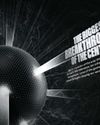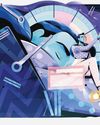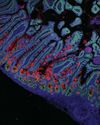
Iam a geneticist, which, last time I checked, is a perfectly upstanding profession. I mean my mother-in-law still speaks to me, so that must be a good thing, right?
And yet, when I reveal that I study the genetics of body weight and that your genetics can be the driving cause of obesity, I become a bad person. I'm perceived as giving overweight or obese people terms I don't use in a pejorative fashion - an excuse.
This has always been an interesting take for me. If I were studying something else, like the genetics of cancer, dementia, arthritis or any other disease, would I suddenly be giving the people who are suffering from those conditions an excuse? I'd hope not. Instead, I hope that people would understand that I'm trying to understand biology and mechanisms, and, shocking I know, I might even be trying to help some of them.
IT'S IN THE GENES
When we talk about body weight, it's all too often considered to be a matter of lifestyle', a habit, a lack of willpower, a choice. The reality is that while rapid changes in our food environment and lifestyle have undoubtedly driven up the obesity figures worldwide, there are many people who are skinny and others who aren't. There's clearly a large variation in body weight, even in the 'obesogenic' environment we live in today (one that promotes weight gain). A large part of this, although by no means all, is down to genetics.
Much of the evidence for a genetic basis to body weight has come from the study of twins. There are identical twins (who are, for all intents and purposes, genetic clones of each other) and there are non-identical twins (who share as much genetic material as you would with your own siblings or parents - 50 per cent). If you study a large enough number of twin pairs, let's say thousands, then you can examine any given human trait or behaviour and compare the variation if 100 per cent of genes are shared versus 50 per cent.
Denne historien er fra June 2024-utgaven av BBC Science Focus.
Start din 7-dagers gratis prøveperiode på Magzter GOLD for å få tilgang til tusenvis av utvalgte premiumhistorier og 9000+ magasiner og aviser.
Allerede abonnent ? Logg på
Denne historien er fra June 2024-utgaven av BBC Science Focus.
Start din 7-dagers gratis prøveperiode på Magzter GOLD for å få tilgang til tusenvis av utvalgte premiumhistorier og 9000+ magasiner og aviser.
Allerede abonnent? Logg på

THE WORST IDEAS OF THE 21ST CENTURY
NOT ALL IDEAS CAN BE HITS. ALONGSIDE GROUND-BREAKING INNOVATIONS, 21ST-CENTURY SCIENTISTS HAVE HELMED THEIR SHARE OF WILD TECH FLOPS, DUBIOUS THEORIES AND OVERHYPED BREAKTHROUGHS. HERE ARE THE BIGGEST TO FORGET

10 IDEAS THAT WILL SHAPE YOUR NEXT 25 YEARS
Predicting the future is considered a fool's game. But it's one many of us like to play.

THE BIGGEST BREAKTHROUGHS OF THE CENTURY
We're a quarter of the way into the new century. To mark this milestone, we asked the UK's top minds to highlight some of the game-changing scientific breakthroughs shaping our world since the year 2000

DO THE SCIENCE COGNITIVE SHUFFLE
Trouble sleeping? A lot on your mind? Use this trick and sedate your synapses

WHAT DETERMINES HOW MANY ABS I CAN GET?
Assuming you're a human being, you have exactly the same number of abs as everybody else: two.

HOW CAN I IDENTIFY MY PSYCHOLOGICAL BLIND SPOT?
In the 1950s two American psychologists, Joseph Luft and Harrington Ingham, proposed a way of thinking about psychological blind spots - things you don't know about yourself - that they called the 'Johari Window' (the term is a combination of their first names).

How can I change my personality?
Want to become more confident, extroverted or assertive? Science shows that with a few simple changes, you can unlock your best self

Could your cosmetics be harming your health?
Cosmetic companies are phasing out microplastics and so-called 'forever chemicals' to help protect consumers.

extraterrestrial US Congress is talking about activity again. Is the truth really out there?
Despite several testimonies, the question remains frustratingly unanswered

Map of 100 million human body cells revealed
Over three dozen new studies mark significant milestone towards complete Human Cell Atlas